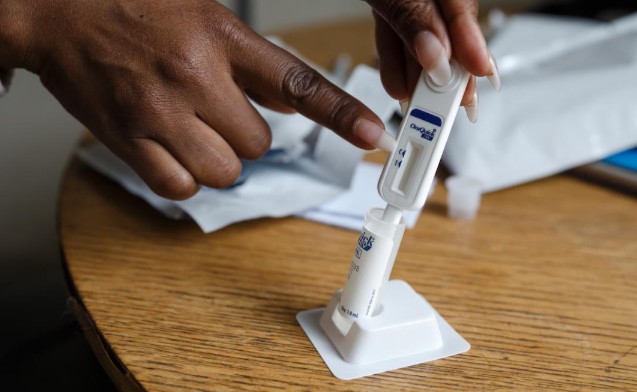|
Getting your Trinity Audio player ready…
|
By Joyce Mukucha
In an effort aimed at eliminating mother-to-child transmission (MTCT) of HIV and syphilis, dual test kits which cost less than $1, are now available for pregnant women, the World Health Organization (WHO) announced this Monday.
The combo test to significantly increase access to innovative combined rapid testing for HIV and syphilis which has been made possible through a partnership by MedAccess, the Clinton Health Access Initiative (CHAI) and SD Biosensor will now be the first WHO prequalified combination to be purchased by public sector in low- and middle-income countries.
Syphilis remains the second leading cause of stillbirths globally and is attributed to 11 percent of all stillbirths occurring each year across Africa.
Each year, around 1.3 million women living with HIV become pregnant and just under one million pregnant women are infected with syphilis.
It has been highlighted by CHAI that this new price can contribute to bridging the gap of more than 6 million pregnant women in the highest-burden countries who know their HIV status but are currently not tested for syphilis.
“The point-of-care rapid diagnostic test enables simultaneous diagnosis of both syphilis and HIV in under 20 minutes from a single finger-prick sample. Pregnant women with a confirmed diagnosis can start treatment more quickly, protecting both their health and their unborn child. Each year, more than 210,000 stillbirths or newborn deaths are caused by congenital syphilis, which could be prevented if the mother is tested and treated in time.”
Despite affordable diagnostics and treatment being available, undiagnosed and untreated infections continue to affect the lives of many mothers and their children.
According to WHO, the rapid diagnostic tests are simple to use and can integrate and streamline services. They can also enable more countries to eliminate mother-to-child transmission (EMTCT) of HIV and syphilis.
Meg Doherty, Director of WHO Global HIV, Hepatitis and STI Programmes said the announcement of the new dual HIV/syphilis test pricing was an exciting development which will significantly contribute to the WHO’s goal of eliminating mother-to-child transmission of HIV, syphilis and hepatitis B as well as extending beyond the health of the child.
“It will help more countries adopt the dual HIV/syphilis testing and accelerate progress toward EMTCT for both HIV and syphilis and deliver services for key populations, where both HIV and syphilis infections are common,” said Doherty.
It has also been learnt that combining effective treatment delivery with increased syphilis screening rates that match those for HIV among pregnant women in the 20 highest-burden countries could eliminate one-third of the adverse outcomes resulting from syphilis infection saving at least 74,000 lives and averting 53,000 cases of severe illness each year.
The CHAI interim co-CEO Ms. Joy Phumaphi, said, “Every year hundreds of thousands of syphilis infections pass undiagnosed from mothers to their unborn children, resulting in stillbirths, congenital defects, or deaths of their newborns. In many cases, they never even know the cause. This agreement has the potential to revolutionize syphilis testing in low- and middle-income countries, ensuring mothers are tested during their pregnancy and provided with affordable and readily available treatment to cure the disease and prevent transmission.”
Meanwhile, in 2018, Zimbabwe has seen large increases in testing among three key groups as a result of self-testing: men, adolescents and those who had never previously tested for HIV. Among the population of 16-to-24-year-olds, for example, uptake of testing increased from 35 to 74 percent, according to the WHO.
On the other hand, in Zimbabwe, efforts are being made to eliminate MTCT of HIV and syphilis as well as meeting WHO validation criteria which requires that targets are met even in lowest performing districs though gaps still exist because of a plethora of reasons such as late or no antenatal care booking in health facilities and closure of health facilities during Covid-19.
Concerning the National Antenatal care Syphilis Cascade January to June 2021, Assistant Programs Officer for Prevention of Mother to Child Transmission(PMTCT) in the Ministry of Health and Child Care, Rumbidzai Mugwagwa said majority of districts have coverages below 95 percent.
“Coverage for syphilis testing in antenatal care was 82% below target of 95%. National treatment coverage was 96%. Missed opportunities for syphilis testing were more in Harare with 63% and Maniacaland 77% whilst only Bulawayo achieved 95% coverage,” said Mugwagwa.
She highlighted that Zimbabwe was also working in line with WHO criteria for validation of elimination of mother to child transmission of HIV and syphilis and again working to achieve the nation’s EMTCT 2018-2022 Plan.
“Developed as part of milestones for EMTCT validation, by 2022 we strive to achieve the GOLD TIER as we try to reach <5% rate of MTCT. We are also working bon reduction of new paediatric HIV cases to <250/100,000 live births and reduction of new cases of syphilis to <250/100,000 live births.”
Taking it back to the availability of affordable test kits, since 2019, WHO has recommended using these tests not only as the first line in antenatal care to help countries eliminate mother-to-child transmission, but also as a way to cut costs.
Up to today, the agency has prequalified three different dual HIV/syphilis rapid tests.
Many countries have adopted these recommendations and are introducing the tests, particularly in the African Region.
WHO estimates that last year, major donors and Governments had procured more than five million of these tests – and that the number should continue to rise.
Nigeria, for example, started a pilot programme in 2019 and is now moving toward implementation at the national scale. As the country plans to distribute four million in the coming year.
And yet, despite some important gains, global adoption of dual HIV/syphilis rapid tests in antenatal care is still far from ideal, with only 23 per cent of all countries reporting a national policy.
